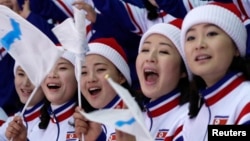They sleep in separate dorms, travel in different buses and government minders watch over them, but North Korean members of the united Korean women's ice hockey team are bonding with their team-mates from the South, thanks partly to K-pop.
Before the team, the first inter-Korean side to compete at an Olympics, took to the ice at the Pyeongchang winter Games against Sweden on Monday, they used a K-pop tune to settle their nerves.
"They were in a locker room, they were singing, dancing ... I think our players were teaching them how to K-pop dance," said the coach, Canadian Sarah Murray.
The two Koreas have been divided by a heavily militarized border since the 1950-53 war, and both sides are using the Games as a way of easing tensions.
Defection is an unspoken fear at the Games, with North and South keen to avoid any incident that could ruin the mood of rapprochement, nowhere more evident than on the ice hockey rink.
Each night, players from the North sleep in a different building inside the Olympic athletes' village. Though the team eats dinner together and has gone to the seaside for coffee, the northerners are watched over by government minders, Murray said.
"But they're not interfering," the coach added.
Of the 12 northern players, only one has so far appeared at a news conference at Pyeongchang. None of them has mingled with reporters in the co-called mixed zone after each match.
But players from the South, who make up the bulk of the team, say the team is bonding, even if the last-minute combination has complicated their uphill quest for a medal.
One of the South's youngest players, 19-year-old forward Choi Ji-yeon, said that when she had first met players from the North at a competition four years ago, they had given her and her teammates the cold shoulder. Now she calls them sisters.
"The North Korean unnies (older sisters) kindly approached me. I got close to all of them," Choi said after the team lost to Sweden, its second defeat after a loss to Switzerland.
Though the unified team, whose uniform features a blue map of a borderless Korean peninsula, have lost heavily in their first two games, against medal contenders on both occasions, they have captured the imagination of South Korean fans.
"I thought North Koreans belong to an entirely different world. But I feel like we have become one," South Korean spectator Han Yu-jin, a 20-year-old university student, said during the game against Sweden.
The common foe, Japan
That inter-Korean sporting harmony should peak on Wednesday when the team takes on Japan, a former colonial power on the peninsula and common arch rival for both North and South Korea.
"We have no options other than winning," South Korean forward Kim Hee-won said. "A Korean has a different mindset for a Korea-Japan match."
The coach, Murray, who had misgivings when she was asked to welcome the northern players into her squad just a few weeks before the Games, is also pleased with how they are bonding.
"They are doing great," Murray said.
"When you see them sitting at the table, you can't tell who is from South Korea, who is from the North ... They are laughing. They are just girls, they are just hockey players."
In truth, the unified team is more than a sum of two parts.
Four of South Korea's 23 players are naturalized athletes born and raised in America or Canada, and another two hold dual citizenship of South Korea and the United States.
That makes this a team of four nations.
"Even though for me I can't talk to most of them because I don't speak Korean, we still smile and hug each other every day," said Park Yoon-jung, who was born in Korea and adopted by an American couple and raised in Minnesota.
Randi Heesoo Griffin, an American of South Korean heritage, said the North Koreans added a layer of difficulty to team bonding.
"It's definitely a more difficult process than with just the South Korean players ... I think on the ice you can connect just through the fun of playing the game."
A senior American member of the International Olympic Committee, Angela Ruggiero, a four-times ice hockey world champion and Olympic gold medalist, has suggested the unified team be nominated for the Nobel Peace Prize.
Murray, the coach, is pleased her team has made such a big impression at the Games, but says they are focused on winning the next game rather than any prestigious award.
"To me we are just a hockey team and we are just playing hockey. I don't think that we are trying to win any awards."





